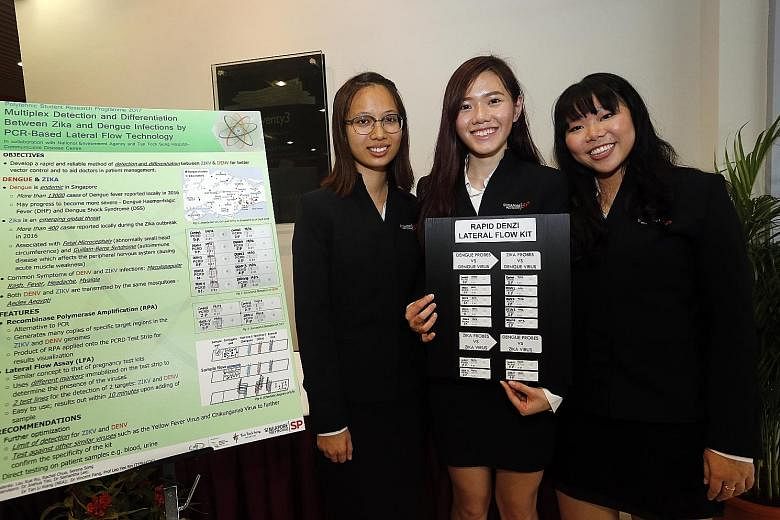A team from the Singapore Polytechnic has devised a kit to detect and distinguish between Zika and dengue infections.
With the possibility of both Zika and dengue infections circulating in Singapore concurrently, the team of three Diploma in Biomedical Science students created a faster method of diagnosis than the existing technology, which takes two to four hours.
The team's kit won a Polytechnic Student Research Programme Award, given out in a ceremony at Ngee Ann Polytechnic's auditorium last Wednesday. The kit was developed in collaboration with Tan Tock Seng Hospital and the National Environment Agency (NEA).
When genetic material of viral cells is applied on a test strip, a test line appears, allowing identification of the specific virus within 10 minutes. The test is non-invasive and the test-line mechanism bears similarity to a pregnancy test kit.
The team conducted the experiment with viral cells cultured in the laboratory as well as harmless Zika virus strains provided by the NEA. The members have yet to test the device with blood or urine samples as the experiment is in its preliminary stages.
Team member Rachel Chua, 20, said the project's role is in "taking learning out of the classroom".
"When it comes to patient management, you strive for faster, better results. With a faster clinical diagnosis, you can put a patient's mind at ease and doctors can start planning medical procedures sooner."
She noted that a driving force for the all-female group's seven-month project was the impact of the Zika virus on pregnant women and their foetuses, who could be at risk of contracting microcephaly, a condition in which a baby is born with an abnormally small head, brain damage and developmental delays.
"It's an issue that is close to heart, and if we want to start our own families in the future, we don't want to have to worry about something like Zika affecting our children."
Annika Mock
Correction note: In an earlier version of the story, we said that the event was held at Nanyang Polytechnic. This is incorrect. It should be Ngee Ann Polytechnic. We are sorry for the error.

